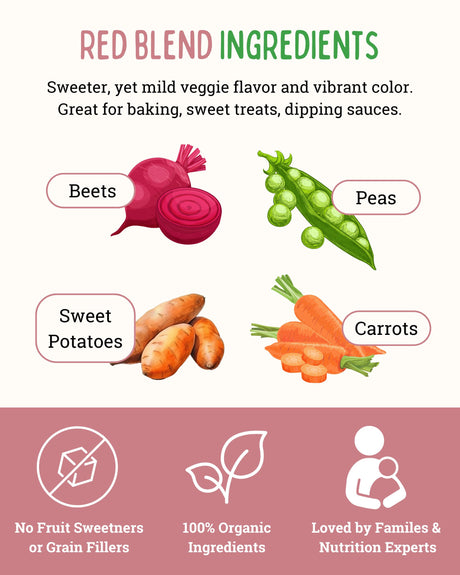Understanding the Nutrition-Mental Health Link
In today's fast-paced world, where children are exposed to various stressors, the connection between childhood nutrition and mental health has never been more important. Research shows that the food children consume can significantly impact their mood, behavior, and overall mental well-being.
Empowering Parents and Caregivers
For parents and caregivers, understanding this vital link can be a game-changer. By recognizing the role of nutrition in mental health, you can make informed choices that support your child's emotional and psychological development.
This blog aims to empower you with knowledge and practical strategies to nurture your child's mental well-being through nutrition.
Understanding the Link
Nutrition's Impact on Mental Health
Nutrition has a profound impact on children's mental health. The food they consume provides the building blocks for neurotransmitters, the brain's messengers that influence mood, behavior, and cognition.
A balanced diet contributes to stable emotions and cognitive function, while a poor diet can disrupt these crucial processes.
Essential Nutrients and Brain Function
Essential nutrients play a pivotal role in brain development and function. Nutrients like omega-3 fatty acids, vitamins (particularly B vitamins), minerals, and amino acids are vital for cognitive processes, memory, and emotional regulation.
Ensuring your child receives these nutrients is crucial for their mental well-being.
Diet and Mental Health Disorders
Research has linked unhealthy dietary patterns, high in sugary and processed foods, to an increased risk of mental health disorders in children. Conditions like depression, anxiety, and attention deficit hyperactivity disorder (ADHD) have been associated with poor nutrition.
Understanding this connection is the first step in promoting mental health through diet and lifestyle choices.
Building a Foundation: Nutrient-Rich Foods
Emphasizing Whole, Nutrient-Dense Foods

To support children's mental health, it's crucial to prioritize whole, nutrient-dense foods. These foods are packed with essential nutrients that foster optimal brain function and emotional well-being. Whole foods are free from added sugars, excessive processing, and artificial additives, making them a healthier choice for kids.
Key Nutrients for Mental Health
Several key nutrients are essential for promoting mental health in children:
- Omega-3 Fatty Acids: These healthy fats found in fatty fish like salmon and flaxseeds play a crucial role in brain development and reducing the risk of depression.
- B Vitamins: Specifically, B6, B9 (folate), and B12 are vital for mood regulation and cognitive function.
- Iron: Iron deficiency can lead to fatigue and decreased cognitive function in kids.
- Zinc: This mineral is important for memory and attention.
- Antioxidants: Vitamins C and E, along with selenium, protect the brain from oxidative stress.
Nutrient-Rich Food Sources

To ensure your child receives these important nutrients, incorporate foods like fatty fish (salmon, mackerel), leafy greens (spinach, kale), nuts and seeds, lean meats, whole grains, and legumes into their diet. These foods provide a variety of nutrients that support mental health and overall well-being in children.
The Gut-Brain Connection
Understanding the Gut-Brain Axis
The gut-brain axis is a fascinating connection between the gastrointestinal system and the brain. It involves a complex network of communication between these two systems, highlighting how our gut health can significantly impact mental well-being.
Emerging research suggests that imbalances in the gut microbiome can influence mood, behavior, and cognitive function in children.
Probiotics and a Healthy Gut Microbiome

Probiotics, often referred to as "good bacteria," are essential for maintaining a healthy gut microbiome. These beneficial microorganisms play a crucial role in digestion, nutrient absorption, and immune function. Furthermore, they are associated with improved mood regulation and reduced symptoms of anxiety and depression.
Encouraging your child to consume probiotic-rich foods like yogurt, kefir, sauerkraut, and kimchi can contribute to a balanced gut microbiome and potentially enhance their mental health.
Fostering Gut Health Through Nutrition
To support a healthy gut, prioritize a diet rich in fiber, fruits, vegetables, and whole grains. Fiber acts as a prebiotic, nourishing the good bacteria in the gut. Limiting highly processed foods, artificial sweeteners, and excessive sugar intake is also crucial for maintaining gut health.
A balanced and diverse diet plays a pivotal role in nurturing the gut-brain connection, positively influencing children's mental health.
Balanced Meals for Emotional Balance
The Significance of Balanced Meals
Balanced meals are a cornerstone of emotional well-being in children. They provide a stable source of energy and essential nutrients needed for optimal brain function.
When kids consume meals that combine carbohydrates, protein, and healthy fats, they experience more consistent energy levels throughout the day, reducing mood swings and irritability.
Sample Meal Ideas for Emotional Well-Being

Creating meals that promote emotional balance doesn't have to be complicated. Consider serving whole grain pasta with a tomato and vegetable sauce, lean protein, and a side of steamed broccoli. Alternatively, opt for a balanced breakfast like oatmeal topped with nuts, seeds, and fresh berries.
These meals provide a mix of carbohydrates, proteins, and healthy fats, offering the nutrients required for stable moods and emotional regulation.
The Role of Regular Mealtimes
Establishing regular mealtimes is essential for regulating mood in children. Consistent eating schedules help stabilize blood sugar levels and prevent energy crashes, which can lead to irritability and mood fluctuations.
Encourage your child to eat breakfast, lunch, and dinner at roughly the same times each day, and incorporate healthy snacks to bridge the gap between meals. This routine contributes to emotional stability and helps children better manage their emotions.
Sugar, Processed Foods, and Mental Health
Detrimental Effects of Excessive Sugar and Processed Foods
It's crucial to recognize the detrimental effects of excessive sugar and processed foods on children's mental health. A diet high in added sugars and heavily processed foods has been linked to mood swings, increased anxiety, and even depression in kids. These foods can lead to rapid blood sugar spikes and crashes, causing irritability and difficulty concentrating.
Strategies for Reducing Sugar and Processed Food Intake
Reducing sugar and processed food consumption is essential for supporting children's mental well-being. Start by reading food labels and identifying hidden sugars in products. Encourage whole foods like fruits, vegetables, and whole grains.
Limit sugary beverages and opt for water or milk. Involve your child in meal planning and grocery shopping, educating them about making healthy choices. Gradual changes can lead to long-lasting improvements in mood and overall mental health.
Benefits of Whole, Unprocessed Foods
Whole, unprocessed foods are rich in essential nutrients that support mental health. Incorporate foods like leafy greens, berries, nuts, and lean proteins into your child's diet. These nutrient-dense options provide antioxidants, omega-3 fatty acids, and vitamins that play a vital role in brain health.
By focusing on whole foods, you not only improve your child's mental well-being but also set a foundation for lifelong healthy eating habits.
Hydration and Brain Function
Importance of Proper Hydration for Cognitive Function
Proper hydration is often underestimated in its role in cognitive function. Dehydration can lead to decreased alertness, difficulty concentrating, and mood swings in children.
When the brain is not adequately hydrated, it struggles to perform essential functions, affecting memory, problem-solving, and overall mental clarity. To support optimal brain function, it's crucial to ensure your child stays well-hydrated throughout the day.
Encouraging Kids to Drink Enough Water
Encouraging kids to drink enough water can be challenging, especially when they are used to sugary drinks. To make hydration appealing, consider using fun water bottles with colorful designs. Create a hydration schedule, reminding them to take sips throughout the day.
You can also infuse water with slices of fruits like lemon, lime, or berries to add a hint of flavor. Additionally, include water-rich foods like watermelon and cucumber in their diet to boost hydration levels.
Impact of Sugary Beverages on Mental Health
Sugary beverages, including sodas, energy drinks, and fruit juices, can have a significant impact on mental health. The excessive sugar and artificial additives in these drinks can lead to blood sugar spikes followed by crashes, resulting in mood swings and irritability.
Moreover, they often displace healthier beverage choices like water and milk. By limiting sugary beverages, you not only improve your child's mental well-being but also promote healthier hydration habits.
Mealtime Environment and Mindful Eating
Significance of a Positive Mealtime Atmosphere
Creating a positive mealtime atmosphere is essential for nurturing healthy eating habits and supporting children's mental well-being. When mealtime is a stressful or negative experience, it can lead to emotional distress and picky eating. To cultivate a positive environment, aim for calm and pleasant mealtimes.
Avoid pressure tactics, such as forcing your child to eat, and instead focus on fostering a relaxed atmosphere where eating is an enjoyable and stress-free activity.
Promoting Mindful Eating Habits in Children
Mindful eating is a valuable skill for both physical and mental well-being. Encourage your children to pay attention to their food by engaging their senses. Encourage them to observe the colors, textures, and smells of their meals.
Encourage slower eating by teaching them to chew their food thoroughly and savor each bite. Mindful eating helps children appreciate the flavors and textures of their food, promoting a healthier relationship with eating and a greater sense of well-being.
Family Meals as an Opportunity for Connection and Mental Well-being
Family meals are not just about nourishing the body but also nurturing the mind and spirit. They provide an opportunity for connection, conversation, and bonding, which are essential for children's mental well-being. Regular family meals allow children to share their experiences, feelings, and thoughts in a supportive and loving environment.
These moments of connection can help reduce stress, build resilience, and contribute to a positive mental outlook. Make an effort to prioritize family meals as a time for both nourishment and emotional connection.
Addressing Special Dietary Needs
Catering to Dietary Restrictions and Allergies
When addressing special dietary needs for children, it's essential to consider any allergies, intolerances, or dietary restrictions they may have. Some children may require gluten-free, dairy-free, or nut-free diets due to allergies or sensitivities. Others may have specific dietary preferences, such as vegetarian or vegan diets.
Catering to these needs is crucial to both their physical health and mental well-being. Be diligent in reading food labels and selecting suitable alternatives to ensure your child's diet remains safe and nutritious. Encourage open communication with your child about their dietary restrictions, helping them understand the importance of their unique eating plan.
Collaborating with Healthcare Professionals for Specialized Diets
For families facing complex dietary challenges, collaborating with healthcare professionals is invaluable. Pediatricians, registered dietitians, and allergists can provide guidance and support tailored to your child's specific needs.
These experts can help you create a nutritionally balanced and safe meal plan, ensuring that your child gets the essential nutrients required for their growth and development. If your child has multiple allergies or complex medical conditions, consulting with healthcare professionals will help you navigate the intricacies of their diet effectively.
Resources for Parents Facing Unique Dietary Challenges
Navigating unique dietary challenges can be overwhelming for parents. To make this journey more manageable, seek out resources that offer information, guidance, and support. Online forums and support groups can connect you with other parents who share similar experiences. Reputable websites and books on specific dietary topics can provide valuable insights and recipes tailored to your child's needs.
Additionally, don't hesitate to reach out to local or national organizations dedicated to specific dietary issues, as they often offer resources, workshops, and expert advice to help parents successfully manage their child's unique dietary requirements.
Key Takeaways
In this blog, we've unraveled the intricate relationship between childhood nutrition and mental health. We explored the profound impact of nutrition on a child's emotional well-being, cognitive development, and overall mental health.
Key takeaways include the importance of nutrient-rich foods, the role of a positive mealtime environment, and the consequences of excessive sugar and processed foods on mental health.
The Significance of Childhood Nutrition for Mental Health
The link between childhood nutrition and mental health cannot be overstated. Nutrient-dense foods are the building blocks for a child's growing brain and emotional resilience. Providing a balanced diet with essential nutrients can pave the way for stable moods, improved cognitive function, and better emotional regulation.
Conversely, diets high in sugar and processed foods can contribute to mood swings and anxiety. By prioritizing healthy eating habits, parents and caregivers can significantly impact a child's mental well-being.
Taking Action for a Brighter Future
We encourage you to put these insights into practice to nurture the mental well-being of your children. Start by offering nutrient-rich foods that support brain development and emotional stability.
Create a positive mealtime atmosphere that fosters mindful eating and connection.
If your child has special dietary needs, seek guidance from healthcare professionals to ensure they receive adequate nutrition. By implementing these strategies, you can help your children grow into emotionally resilient and mentally thriving individuals.
Leave your comments below; we love to hear from you! And don't forget to follow EasyPeasie for more veggie info and convo on YouTube, Facebook, and Instagram! ~ThePeas













